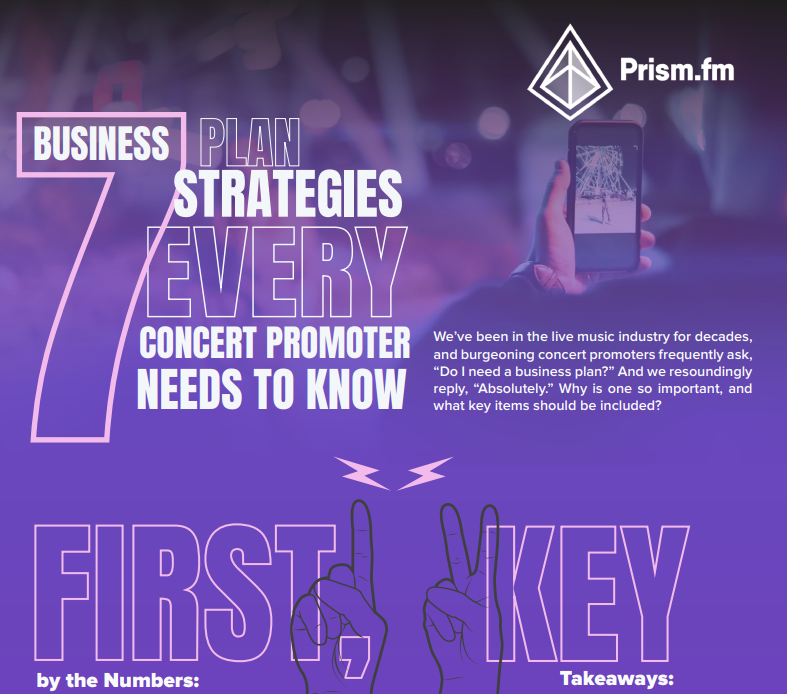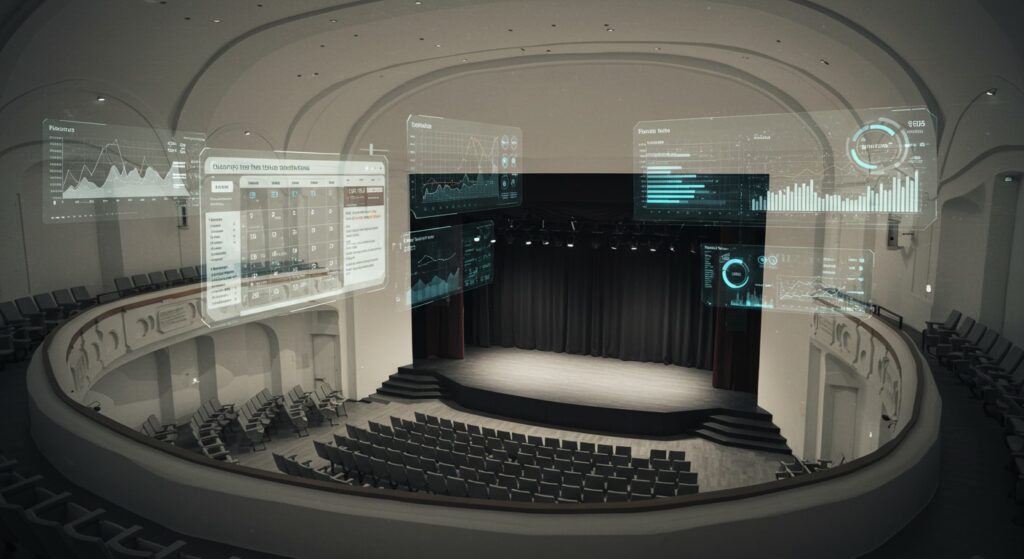
Tips for Creating the Essential Concert Promoter Business Plan
Despite being one of the most important things you will do, many concert promoters still wonder if they need a business plan. Although it’s tempting to be in the mindset that “this is the goal, now reach it by whatever means,” a more detailed plan that prepares you for the best and worst while organizing everything in between cannot be disregarded.
In fact, those that prioritize business planning can expect a return on investment (ROI) of up to 6700%. This is because it will—among other things—increase clarity, provide structure, inform strategies & decisions, support funding, and organize every touchpoint.
But you don’t want to create just any concert promoter business plan. You want it to be strong, optimized, and supported by a platform that will elevate your concert-promoting capabilities. Keep reading for the top tips every concert promoter needs when creating the ultimate business plan.
The importance of having a concert promoter business plan
A concert promoter business plan is essential to a successful event because it covers all your bases and ensures everything is organized and accounted for, helping you move forward confidently and avoid any unfortunate surprises. It outlines the strategies, goals, and actions a concert promoter intends to take to promote and produce live music events.
These elements have become essential in today’s market, where the Live Music industry has become saturated with competitors. In fact, the compound annual growth rate (CAGR) of live music is 3%, with competitors jumping at the opportunity to make an imprint in such a consistently growing industry.
Related: Standing Out in Crowded Live Music Venue Markets
A solid business plan ensures your event drowns out all the noise and gains the attention it deserves to stand out in a crowded market. Here are seven tips for creating a concert promoter business plan that boosts experiences, relationships, and overall success.
1. Conduct market research and define your target audience
To effectively market your upcoming event, conducting market research to gather more data on your target audience is essential. Market research is not just about identifying your target audience; it’s also about understanding how to effectively market your event to them. This includes attracting attendees through targeted marketing efforts and creating an engaging experience for them during the event with access to performers, audience participation activities, and more.
By conducting thorough research, you can uncover valuable insights about your audience’s preferences and desires, which will help you tailor your marketing efforts and event experience accordingly. So, it’s crucial to listen closely to what your audience wants and use the data you gather to create an unforgettable event that they will love.
When conducting market research, remember to:
- Find out how to speak their language — what terminology do they use? Are they more professional or casual? Pro Tip: Learn the language of your audience by evaluating them through social media, interviews, face-to-face interactions, and industry-leading competitors.
- Reach them on their preferred channels. Pro Tip: Start with current data and analytics you already have access to and decide which platforms suit your audience best. From there, track and measure your efforts to optimize your channels, creative, copy and posts.
- Understand what appeals to them. Pro Tip: This will build trust and loyalty in your audience. Music is personal, and conveying to your audience that you “get them” will have a reciprocal effect while engaging their interest.
As you get more familiar with concert promoter business planning, you will continue to expand your data and insights, updating and improving your information for more precise targeting.
2. Make your goals S.M.A.R.T.
The best business plans will include specific and measurable goals that align with overall objectives. The more details you can add to your goals, the better positioned you and your team will be to achieve those goals. A great example of the difference between a vague goal and a SMART (Specific, Measurable, Attainable, Relevant, and Timely) goal can be seen in the following example:
Vague Goal: ‘increasing attendee numbers’
SMART Goal: By the time of our event on August 30th, our attendee number will increase by 50% from where it’s at now (250 attendees) by sending out three email reminders to our subscriber lists and using paid advertising on social media.
These detailed and well-defined goals will better position you and your team to achieve success and track progress toward your objectives.
Related: How to Set S.M.A.R.T. Goals for the Growth of Live Music Venues
3. Define your unique selling point
A unique selling point is important in every business because it helps you, your events, and your services stand out. Consider the businesses you partner with and how you can position yourself in a way that addresses their pain points with promoters.
If you have difficulty pinpointing what makes you unique, consider starting with:
- The type of concerts you specialize in
- The target audience you know best and resonate with most
- Where you have more experience
- Where you have more knowledge
- If you have an organizational edge
4. Create your detailed budget
There are few business planning components that are more important than your budget. A detailed budget will help ensure that your resources are allocated effectively, keeping your business sustainable over time and minimizing the risk that you overspend. The right budget planning will allow you to bring your vision to life within the boundaries of your financial means.
5. Determine your financial projections
To secure funding from investors or lenders, it’s necessary to present a compelling case supported by your projections. Include key information, such as estimated income and expenses, a break-even analysis, and a cash flow projection, to demonstrate the viability of your business plan and the potential for success.
Financial projections are also great insight for tracking the performance of your business over time, helping to inform real-time tactics and future strategic decisions.
6. Outline your full operational & marketing plan for events
To ensure a successful event, it’s essential to develop a comprehensive plan that covers all the necessary details. This includes creating a detailed outline of your operations, such as ticket sales, logistics, and security. By doing this, you can identify potential issues early and make quick adjustments to keep things on track.
In addition to your operations plan, you’ll need to develop a robust marketing strategy that effectively promotes your event. There are many marketing tactics to choose from, but not all of them will be right for your budget and goals. Some of the most popular and effective event-promoting tactics include creating event websites, using email marketing to make announcements and send reminders, utilizing QR codes, collaborating with relevant influencers, and leveraging social media channels and features.
To determine the best marketing tactics for your event, it’s important to do your research ahead of time. Take the time to explore all of the available options, such as creating event pages and listings on various free or paid platforms and running contests. By doing so, you can identify the most effective tactics for your budget and audience, ensuring your event is a success.
In today’s increasingly digital world, you cannot afford to disregard using digital strategies in your concert promotions. However, that doesn’t mean you should ignore the power of offline strategies, like direct mail, in-person promotions, billboards, etc. Consider cost, expected attention and ROI for different online and offline strategies to help you understand which is best for your audience and business goals.
Here are three tips you need to maximize your marketing plan results:
- Research and test your marketing channels and tactics in advance.
- Don’t silo offline and online strategies—they work better together. For instance, a Q.R. code on direct mail can increase traffic to your event website just as well as a social media post can, with some surveys finding as many as 32% of respondents scanned the Q.R. codes they received within the first week of receiving them!
- If you’re looking to have as little spend as possible, social media advertising can help you target your audience better, and organic social media posts on TikTok currently perform well for awareness, especially if you are able to include the artists in your posts.
7. Use technology to maximize your efficiency, organization and communication
Nothing makes your concert promoter business plan more seamless than using a platform that can help you manage your event from beginning to end—all in one place. Disconnected tools and systems or outdated spreadsheets limit your communication and organization capabilities. In contrast, the right promoter platform streamlines and tracks every detail of your business to keep you on target and ahead of the game.
Prism offers everything you need to stay in sync with the business and come out looking like a rock star to everyone you work with. From revenue and expense tracking, calendar management, and collaboration to offer generation, ticketing, and settlements, you can manage it all with accuracy.
With Prism, you can focus on the business of music while standing out from the pack for being professional, prepared, accurate, and a great communicator—with information ready at the exact moment you need it. Learn more about Prism here.

Matt Ford is the founder and CEO of Prism.fm, an Austin-based software company revolutionizing live music event management. With a background in entrepreneurship and a degree from the University of Wisconsin-Madison School of Business, Ford combined his self-taught coding skills with firsthand experience as a concert promoter to address the inefficiencies he observed in the industry. In 2018, he launched Prism.fm, an all-in-one platform designed to streamline operations for venues, promoters, and agencies by replacing cumbersome spreadsheets with integrated tools for booking, financial tracking, and contract management. Under his leadership, Prism.fm has grown significantly, achieving $3 million in annual recurring revenue post-COVID and securing over $15 million in funding . Ford’s commitment to building user-centric solutions has positioned Prism.fm as a trusted partner for over 1,500 venues and promoters worldwide.



